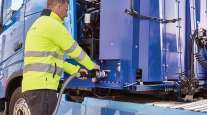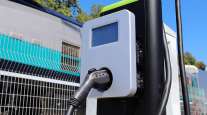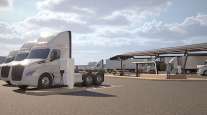Managing Editor, Features and Multimedia
Autonomous, Electric Trucks Show Progress at CES 2022

[Stay on top of transportation news: Get TTNews in your inbox.]
LAS VEGAS — Rapid progress in the development of autonomous and electric-powered commercial trucks stood out as one of the top themes at a technology show known for everything from consumer electronics to advanced robotics.
CES 2022, held Jan. 5-7, featured an array of exhibits by manufacturers, technology companies and startups seeking to make freight transportation safer, greener and more efficient.
The massive annual show returned to the Las Vegas Convention Center this year after shifting to a virtual format a year ago. However, many major companies decided to withdraw from the event due to surging COVID-19 cases in the United States and across the world.

Though some exhibitors pulled out of CES 2022, the event still drew a large contingent of technology professionals. (Seth Clevenger/Transport Topics)
Despite the departure of some exhibitors, the event continued to provide a venue for many companies to present their innovations and visions for the future to a reduced — but still large — audience of technology professionals.
In the freight transportation sector, developers of self-driving vehicle technology highlighted their partnerships with truck manufacturers, as well as their latest progress on the road to commercialization.
TuSimple and Aurora, for example, both became publicly traded companies last year as they continue to actively test and refine their autonomous driving systems designed for on-highway trucking operations.
In its exhibit space, TuSimple showcased a Class 8 International tractor outfitted with its self-driving sensors and software.

A close-up look at TuSimple's autonomous driving technology outfitted on a Class 8 International tractor. (Seth Clevenger/Transport Topics)
The technology company’s elaborate booth also illustrated the highway routes incorporated into its expanding Autonomous Freight Network, which now extends across the southern United States, from Phoenix to Orlando, Fla.
Until recently, TuSimple always had operated its self-driving trucks with a safety driver behind the wheel at all times, but last month the company completed its first fully unmanned test run on an 80-mile route in Arizona with no one in the truck.
TuSimple CEO Cheng Lu hailed that driver-out test as an important milestone for the industry.

Lu
“The autonomous driving industry is still nascent,” he said. “There are a lot of questions that start with ‘if’ or ‘can.’ ”
Being able to demonstrate a driverless run, however, “does go a long way to answering that,” he said.
Elsewhere at the show, truck maker Paccar Inc. showcased three heavy-duty tractors that underscored its investments in electric, autonomous and connected-vehicle technologies for its Kenworth, Peterbilt and DAF brands.
The manufacturer’s exhibit featured a battery-electric Kenworth T680E model along with a Paccar-branded vehicle charger optimized for the zero-emission Class 8 truck, which has a range of 150 miles and is designed for regional haul and urban distribution.
Although electric trucks are in the early adoption phase, that segment of the market is poised to accelerate in the coming years due to regulations, corporate sustainability targets and the broader benefits of zero-emission technology, said Joe Adams, chief engineer at Kenworth Truck Co.
“I think through the back half of the decade, we’re going to see a sizable percentage of trucks we’re selling will be zero-emissions vehicles,” he said.
Another look at @Aurora_inno’s self-driving system on a @PeterbiltMotors Model 579 at #CES2022. pic.twitter.com/5Kkclmc07H — Seth Clevenger (@SethClevenger) January 5, 2022
Peterbilt, meanwhile, unveiled its first Model 579 equipped with Aurora’s self-driving system, illustrating the partnership between Paccar and the autonomous vehicle company.
Paccar also highlighted its global connected truck platform, Paccar Connect, on a cabover model produced by its European DAF division.
Adams predicted that many of these technologies will converge in the future, with autonomy, electrification, hydrogen fuel cell technology and improved connectivity coming together in the trucks of the future.
Some exhibitors at CES showcased autonomous commercial vehicles designed for off-road environments.
.@RoboticResearch showcases a @MackTrucks model equipped with its autonomous driving system at #CES2022. The company, best known for developing autonomous vehicle tech for the defense sector, is also targeting off-road commercial applications such as logging operations. pic.twitter.com/DbDbbNjLZV — Seth Clevenger (@SethClevenger) January 5, 2022
RR.AI, the commercial division of Clarksburg, Md.-based Robotic Research, showed a Mack Anthem model outfitted with its autonomous driving system.
Robotic Research is best known for developing autonomous vehicle technology for the defense sector but also has been applying its technology to transit buses, shuttles and commercial trucks.
In the trucking space, the company is targeting opportunities for autonomous trucks in off-road applications that require delivery of heavy raw materials, such as logging operations.
Another exhibitor, Evocargo, said it intends to bring its autonomous logistics services to the U.S. market by the end of this year.
The company uses electric-powered, unmanned vehicles with no cab or steering wheel to transport pallets and other cargo in restricted areas such as warehouses and airports at relatively low speeds — about 15 mph. The specialized vehicles also feature a hydrogen fuel cell range extender.
.@EvocargoLTD plans to bring its autonomous cargo delivery service to the U.S. market by the end of this year. The unmanned vehicles, designed for restricted sites such as warehouses and airports, are electric powered with a hydrogen fuel cell range extender. #CES2022 pic.twitter.com/0U9v0YHC01 — Seth Clevenger (@SethClevenger) January 5, 2022
Evocargo, which currently works with customers in Europe, is headquartered in Dubai with research and development operations based in Russia. Its vehicles are built in Finland.
Rather than selling its autonomous vehicles, Evocargo owns and operates the vehicles to provide logistics services to its customers.
Although CES returned to Las Vegas this year, the show continued to reflect the uncertain environment caused by the lingering coronavirus pandemic and the spread of the omicron variant.
The absence of many major technology companies that had been planning large exhibits at CES left large vacant spaces in the show’s exhibit halls, which also saw a visible reduction in foot traffic compared with years past. Several press conferences held by industry suppliers also shifted to a virtual format.
Want more news? Listen to today's daily briefing below or go here for more info:




